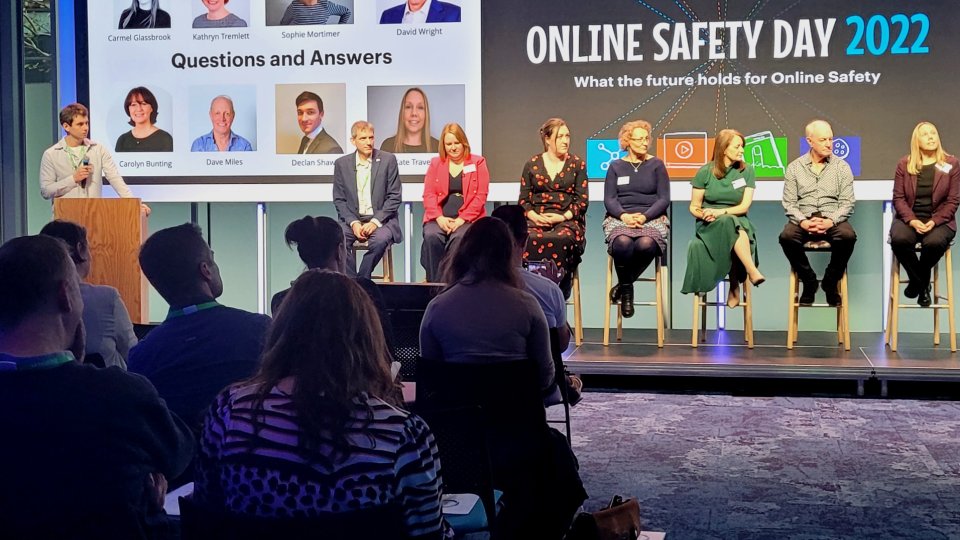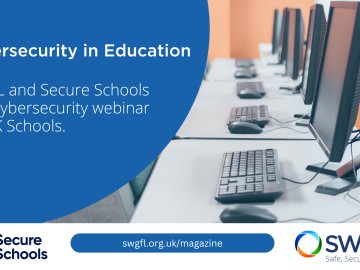With the focus on the future of online safety, Online Safety Day 2022 from SWGfL and powered by Meta, saw hundreds gathered at this year’s first hybrid event which was hosted at Meta’s headquarters in London as well as online.
With a warm welcome from our CEO David Wright, attendees from the educational sector, government, NPOs and the tech sector were treated to a comprehensive overview of the online safety space going forward.
The line-up of speakers, all who have a formidable depth of experience in online safety, was kicked off by Carolyn Bunting MBE, CEO of Internet Matters, an independent, not-for-profit organisation which helps families keep their children safe online.
Carolyn provided interesting insights and trends which included which devices and apps are being used by children (aged 9 – 16) are, as well as highlighting growing concern among parents around online safety. But she noted that this was not mirrored by children, who see their parents and teachers as their main source of information concerning being safe online. She also spoke safety by design and regulation going forward. This as children’s use of technology will continue to increase with time in online environments such as the metaverse.
Next on the speaker’s podium was Dave Miles, Meta’s Director of Safety for Europe, Middle East and Africa. With extensive executive management experience within the technology, charitable and regulatory sectors, Dave also underlined the importance of online safety for all users heading into the future. In his current capacity, Dave Miles is also a member of the WePROTECT Global Alliance’s 2021 Global Threat Analysis (GTA) Steering Group, the Child Dignity Alliance and European Commission’s Alliance to Better Protect Minors Online. He spoke at length around the current inclusions that have happened across Instagram and Quest with new parental controls available for both which then prompted him to link towards the Metaverse and how these recent additions will pave the way for its safety development.
New Innovative Projects
This presentation was followed by Declan Shaw, who is Head of Media Literacy Policy at the Department for Digital, Culture, Media, and Sport and who spoke about delivering media literacy activity with a more co-ordinated and effective approach, which included large scale research projects as well as new innovative projects taking technology into a future to empower all citizens.
Next was Kate Travers, who is Deputy CEO at Childnet and Deputy Director of the UK Safer Internet Centre. She leads on the annual Safer Internet Day and she highlighted the widespread impact of this event and the theme for 2023 Safer Internet Day: ’Want To Talk About It? Making space for conversations about life online’. The next Safer Internet Day will be held on the 7th February. This will focus on young people being able to share any concern about their online experiences and what can be learned from these conversations to provide a better understanding of children’s digital lives.
After a short break, Professionals Online Safety Helpline manager, Carmel Glassbrook highlighted the continuing growth in cases with regard to POSH, as well as highlighting the impact and findings from the Harmful Sexual Behaviour Support Service. The Harmful Sexual Behaviour Support Service ran from January to October this year and the service supported over 700 cases and over 1,800 contacts. The support service provided guidance and advice to professionals from education, social care, youth and healthcare sectors, enabling them to respond to incidents of harmful sexual behaviour (hsb). As Carmel also highlighted in her presentation, SWGfL and partners, the Marie Collins Foundation, are continuing to support those professionals with newly developed resources, as well as video training.
Bringing Positive Change
Also highlighting growing issues being reported online, Report Harmful Content (RHC) manager, Kathryn Tremlett highlighted a 106% increase in cases this year compared to last year, with bullying and harassment being the most reported online harm. She said that the RHC button, which can be downloaded and used by any organisation (not only schools), has been accessed 6000 times across the UK since it was launched.
Looking forward, manager of the Revenge Porn Helpline (RPH), Sophie Mortimer said that the use of the StopNCII.org tool, which provides technology to prevent intimate images from being shared online without consent, is well-placed to bring about positive change. The first anniversary of StopNCII.org will be marked at the beginning of December. She also touched on SWGfL’s new project, Minerva which is currently under development. Minerva will use cutting edge technology which will enable users to be able to track and log their experiences.
To wrap up the presentations, David Wright highlighted this year’s Annual Assessment Report for schools which indicates the on-going need for online safety training, as well as filtering and monitoring in schools. He also touched on the huge number of free resources that are available and used by educational professionals across the country, within our award-winning ProjectEVOLVE toolkit.
A short Q&A session ended our insightful event with the panel of speakers covering a range of questions submitted by attendees, both online and offline and which covered matters such as the Online Safety Bill, amongst others.
Thank-you to everyone for joining us, both in person and online, and of course thanks to all our speakers for sharing their highly informative insights and information. Please access any of our resources or services which are all designed to create safer spaces online so that everyone can enjoy being online free from harm.






